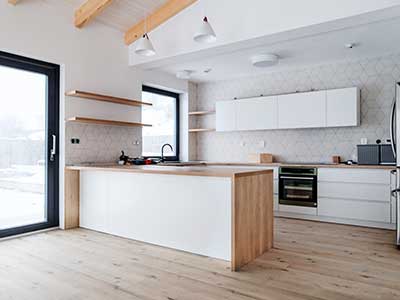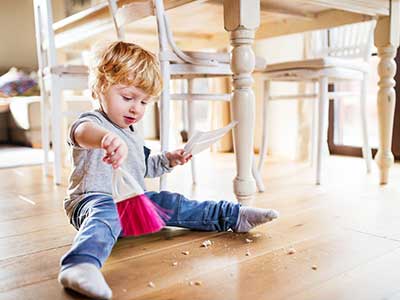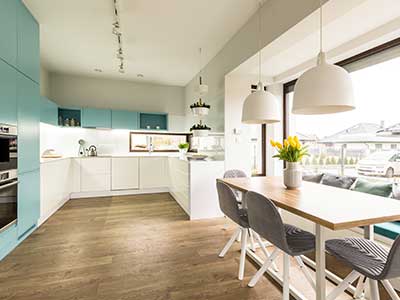Back to Flooring Products
Vinyl Flooring For Your Kitchen - Pros & Cons
 When it comes to redoing your kitchen floors, there are a wide variety of options available. One such option is vinyl flooring - a type of resilient flooring that has seen an increase in popularity over the years due to its many advantages. Vinyl flooring is a great choice for kitchens due to its appealing look and ability to withstand everyday wear and tear.
When it comes to redoing your kitchen floors, there are a wide variety of options available. One such option is vinyl flooring - a type of resilient flooring that has seen an increase in popularity over the years due to its many advantages. Vinyl flooring is a great choice for kitchens due to its appealing look and ability to withstand everyday wear and tear.
Vinyl Flooring in the Kitchen - Pros
Durable and Long-Lasting
Vinyl is a highly durable flooring material, making it an ideal choice for kitchens. In fact, it's so tough that it can withstand just about anything that normal to chaotic households throw at it - from heavy foot traffic and spills to wear and tear. And because it's easy to take care of, with regular cleaning and maintenance, your vinyl flooring should last you between 10 to 20 years. What makes this especially impressive is that these same floors are capable of resisting stains, scrapes and scratches due to its waterproof properties.
Furthermore, the quality of the materials used in the production process ensures that your vinyl floor won't fade over time from exposure to sunlight or other sources of high temperature. Additionally, vinyl is also a great sound barrier - helping reduce noise from outside sources such as traffic or between rooms in your home. Finally, its ease of installation means you can get this type of flooring set up quickly without the need for a professional fitter.
Easy For Maintenance
 Vinyl flooring is extremely easy to keep clean, making it a popular choice for busy households. Its water-resistant properties mean that you don't need to worry about using too much water when cleaning it, so a simple mop or steam mop will easily remove any dirt, dust and debris. Vacuuming the floor with a vacuum intended for hard surfaces is also an excellent way of giving it a light touch-up. Vinyl flooring doesn't need any kind of wax or sealant to keep its protective waterproof layer intact.
Vinyl flooring is extremely easy to keep clean, making it a popular choice for busy households. Its water-resistant properties mean that you don't need to worry about using too much water when cleaning it, so a simple mop or steam mop will easily remove any dirt, dust and debris. Vacuuming the floor with a vacuum intended for hard surfaces is also an excellent way of giving it a light touch-up. Vinyl flooring doesn't need any kind of wax or sealant to keep its protective waterproof layer intact.
This makes it even easier to maintain, as there's no need to strip the floors and apply for extra protection - the existing waterproof layer protects them from water damage and staining. Vinyl is also one of the most durable materials available for flooring, meaning that even if you don't follow all the maintenance instructions exactly - occasional mopping still won't cause any damage. Additionally, vinyl flooring also stands up well against scratches and scuffs compared to other types of hard surface floors like wood or laminate. The material's dense composition means that it can easily handle everyday wear and tear without sustaining damage.
Water and Stain Resistant
Vinyl flooring is an ideal choice for kitchens that experience lots of activity and spills. Not only is it incredibly durable, but it also offers superior water and stain resistance, making it a great choice for busy households. Vinyl floors are made of synthetic materials such as PVC, which are highly water-resistant and can be sealed with a protective coating to make them even more robust. This makes them perfect for rooms that often have grease, food particles, and other liquids spilt on them. Furthermore, the material is nonporous, meaning liquid spills will bead up on top instead of seeping in or staining the surface underneath.
This makes vinyl flooring much easier to clean than other flooring options such as carpet or hardwood because all you need to do is wipe up the spill with a rag or cloth and it’s gone! Vinyl floors are also much more resistant to scratches and dents than other materials which makes them perfect for high-traffic areas like kitchens where people are constantly walking around. Additionally, vinyl floors come in a variety of colours and designs so they can fit any style preference while still providing durability as well as water and stain resistance. Overall, vinyl flooring is one of the best options when it comes to kitchen floors as they offer both beauty and practicality in one convenient package.
Affordability & Comfort
 Vinyl flooring is one of the most affordable and comfortable flooring options for any room of the house. Not only is it extremely cost-effective, but vinyl can also provide a classy look to your home that is similar to more expensive materials, such as hardwood. It's very easy to clean and maintain, and if any particular spot gets damaged, you can patch it up easily with a few simple tools. Vinyl flooring provides an incredibly soft feel underfoot and is ideal to have in the kitchen where we are usually standing for long periods of time while cooking.
Vinyl flooring is one of the most affordable and comfortable flooring options for any room of the house. Not only is it extremely cost-effective, but vinyl can also provide a classy look to your home that is similar to more expensive materials, such as hardwood. It's very easy to clean and maintain, and if any particular spot gets damaged, you can patch it up easily with a few simple tools. Vinyl flooring provides an incredibly soft feel underfoot and is ideal to have in the kitchen where we are usually standing for long periods of time while cooking.
The soft surface provides cushion and reduces fatigue on the feet which makes it much more comfortable to stand on for extended periods. In addition to being more comfortable to stand on when compared to other flooring options such as tile or wood, a softer surface also means less breakage when something gets dropped; glasses and mugs won't shatter if they accidentally slip out of your hands!
Furthermore, due to its construction, vinyl flooring is highly resistant to moisture which makes it perfect inside kitchens and bathrooms; spills don't soak into the material so cleaning up messes is a breeze. As an added bonus, there are many styles of vinyl floors available that you can choose from; these include solid colours, stone looks, modern designs and classic wood grains. With all these features combined together, it’s no wonder why vinyl flooring has become so popular in recent years due to its affordability and comfort levels.
Vinyl Flooring in the Kitchen - Cons
Difficult to Repair
Although vinyl is a highly durable material, it isn't indestructible. Heavy, hot or sharp kitchen objects can potentially damage this tough material and cause unsightly scratches, rips, or gouges. Unfortunately, when it comes to spot repairs for vinyl flooring, the options are limited and often difficult to execute correctly. In order to properly fixing vinyl floors that have been damaged by heavy or sharp objects requires a skilled hand and specialised tools. Even if you do have the know-how to make repairs yourself, it can be time-consuming and expensive to purchase the necessary materials.
Not Environmentally Friendly
Unlike natural materials like wood or stone, which can be biodegradable and broken down into their natural components when they reach the end of their life cycle, vinyl floors are not biodegradable and instead must be thrown away in a landfill. Additionally, due to its composition, it is difficult to recycle vinyl floors, making them a less sustainable choice than others.
However! Despite these drawbacks, vinyl flooring can still be a great choice for your kitchen if you want a cost-effective and stylish option without sacrificing durability. It’s water resistant and easy to clean—making it perfect for kitchens—and with regular maintenance, it can last for years at a time before needing to be replaced.
The decision is ultimately up to you based on what qualities you prioritize in your kitchen flooring, but if affordability and style are high on your list then consider giving vinyl flooring a try! With thoughtful installation and continued maintenance over time, you can enjoy an attractive yet budget-friendly look in your space for years to come.